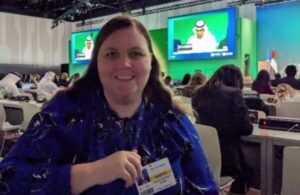Environmental educator sees big role for people of faith
Feb 06, 2024
 Heather Phelps, a longtime Wisconsin resident with deep roots in the UCC, is resource specialist with the Wisconsin Center for Environmental Education, which is housed at the University of Wisconsin-Stevens Point. In December, Heather attended the COP28 climate summit in Dubai as part of the Christian Climate Observer Program. She’ll discuss her experience on Thursday during a webinar sponsored by the Wisconsin Conference Creation Care Team. Learn more and register.
Heather Phelps, a longtime Wisconsin resident with deep roots in the UCC, is resource specialist with the Wisconsin Center for Environmental Education, which is housed at the University of Wisconsin-Stevens Point. In December, Heather attended the COP28 climate summit in Dubai as part of the Christian Climate Observer Program. She’ll discuss her experience on Thursday during a webinar sponsored by the Wisconsin Conference Creation Care Team. Learn more and register.
Heather talked to Wisconsin Conference Life about the importance of the summit – and the role people of faith can play in caring for creation. This interview has been edited for length and clarity.
What were your major takeaways from COP28?
It is really cool how climate change and climate action have become mainstream. There was a long period when it seemed no one wanted to talk about climate change publicly. If the CEO of Shell feels obligated to be there, if North Korea is sending a couple of delegates, it feels as if the world as a whole thinks these discussions are important to be part of.
COP28 was the first time fossil fuels were explicitly called out -– the countries of the world have agreed to transition away from fossil fuels in a just and equitable manner. Every country on earth has at least nominally agreed to abide by that. I don’t want to forget the challenges. At the same time, it’s important not to focus on the ways the glass is half empty and forget the glass is also half full. This really is progress.
What is your message to people of faith?
It’s that this is our responsibility. That Jesus told us to love our neighbor as ourselves, and we cannot do that without caring about how people are going to be affected by climate change. Whether it’s villages in Africa or the homeless on your own street or the elderly in your congregation at risk during heat waves, as we love the people around us we have to realize that every one of these people we care about is going to be affected by climate change. As we work to make world a better place, we need to factor in climate change.
What actions can faith communities take?
It depends where you are on the climate action journey. If you are a congregation that can take solar panels, do it. If you’re not a congregation that’s there yet you can take smaller actions, like installing a couple electric car chargers. And electrify everything you can. Beyond physical things: Talk about it. Educate people about it. Whether it’s a film on an environmental topic or a book study, discussing climate is important. It shouldn’t be an afterthought.
How has your experience shaped your own faith?
It has given me a lot to wrestle with in terms of the question of trusting God versus taking action. You see bumper sticker slogans like “Let Go and Let God.” I don’t think that’s useful when dealing with climate change. The Bible contains a lot of examples of God letting people cope with the consequences of poor choices. The Old Testmanet has examples of God’s anger at the kind of inequality that I see happening in climate change. Rich countries spew carbon into air with no regard for damage to poort countries.
It is very easy to risk falling into hopelessness. But God does not leave us without hope. Even when we don’t see how things are going to work out, we hold on to faith and hope and love and so we keep trying and we don’t give up. We don’t give into despair. That is one thing we as Christians we are uniquely equipped for.
Join the discussion with Heather
Host: Wisconsin Conference Creation Care Team
Time: 7 p.m.
Date: Thursday, Feb. 8
Place: Zoom
Register now
‹ Back to News & Updates



Sign up for our newsletter!
Find us on
Contact Us